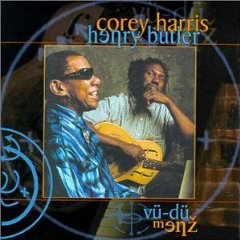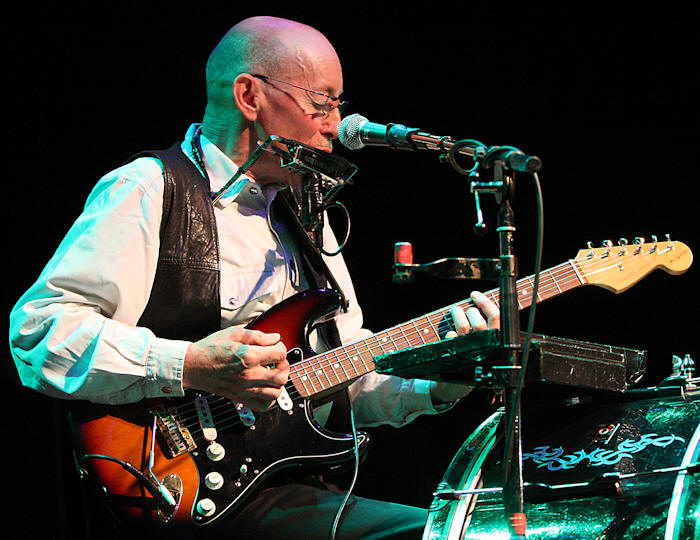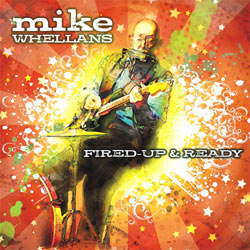
Painting © 2004 Loz
Arkle
Website
© Copyright 2000-2011 Alan White - All
Rights Reserved
Site optimised for Microsoft Internet Explorer



Early Blues Interview |
|
'...one of Scotland's heroes, a bluesman of
amazing ability...a totally brilliant one man band.'
Mike Whellans played the Burnley Blues Festival in April 2009. I caught up with him after his set. Alan: What were your first musical memories growing up in Galashiels? Mike: Well, I was born in Galashiels but I was brought up in the little town of Lauder, which is only about 8 miles away. My first musical memories in Lauder were listening to Scottish country dance music on the radio, people like Jimmy Shand, Ian Powrie and that kind of stuff. I started when I was 13 playing in local country dance bands, playing drums, first with a farmer called Andrew Dickman who played the accordion and it was mostly farmers in the band. I played in the local village halls at the whist drives. And then when I was about 15, I saw an advert in the local paper for a drummer for a rock and roll band, called ĎThe Castle Kingsí, and I got that. We played rock and roll covers Ė Chuck Berry, Fats Domino etc. Alan: Did you always want to become a musician? Mike: Err, I think I did! My father died when I was very young (six weeks old) so I never knew him. He was a drummer in a dance band called the The Optimus Dance Band and I discovered his drum kit up in the attic. My mother found it quite difficult because losing my father was something she never really got over. Theyíd got married quite late and then I came along and he only had me for 6 weeks before he died suddenly. So I think I did it for different reasons. I am self-taught, as was my father with his drums, banjo and ukulele, and my grandfather played fiddle, and my grandmother played piano. So it was natural I suppose for me.
Mike: Ahh! The nearest record shop to Lauder was in Galashiels, called Coulls. It was run by a couple and they were very outgoing for that time. He was very interested in jazz and when Iíd go in, heíd have a catalogue but it was all imports and heíd tell me that weíd have to send away to the States. Iíd look through all these Folkways albums and it was Blind Blake, Sleepy John Estes and all these guys and I didnít really know what was going on but I sent away for three albums, which I still have. Big Joe Williams with his nine string guitar, Sleepy John Estes, Sonny Terry and Brownie McGee. I waited a month and saved all my pocket money. The nice thing about those albums was that they come with a booklet with all the lyrics. When I heard Sonny Terry, something just touched me, it really did something for me. Donít ask my why. A little white boy living in a village in Scotland, suddenly hearing this amazing music, and I went straight out and bought a harmonica and Iíd just sit there and listen, play the record, slow it down and try to get it. My grandfather used to shout up the stairs, ďWill you stop doing thatĒ and I just couldnít. It was just so moving. And later, I heard Robert Johnson and then Little Walter and then the Chicago guys, Jimmy Reed, Juke Boy Bonner and, of course, John Lee Hooker. When I heard John Lee Hooker, that was it for me. Just sitting there, with that pulse and the voice. The voice comes from another place with him. With the possible exception of Joe Cocker, nobody gets close these days to singing like Hooker. He was my big hero. I heard him three times in Denmark, with 3,500 people and you could hear a pin drop when he was on the stage. He was a real cool dresser too, with these wonderful socks with the stars and stripes. And heíd always look at his watch and never go over time. And heíd do that ďshake it baby, shake it baby, shake it one more time...Ē and the place was just in uproar. I never got to meet him, which Iíd love to have done. I met T-Model Ford once when I had to pick him up at an airport in Denmark. I was looking for a younger guy, and this 82 year old came through in leather jacket, jeans and a hat. Alan: Do you see any similarities between traditional Scottish music and early blues music? Mike: Yes, maybe in the way of pulse, rhythm, so Scottish country music has 6/8 time. I often wonder if these blues singers were ever exposed to Scottish music. They were certainly exposed to Bluegrass and that is similar to Scottish music. Itís all connected in some way. Alan: Who are your favourite blues artists? Mike: Whoa Ė too many! I melt with everybody to be honest, even the very primitive singers like the Reverend Gary Davis and Mississippi John Hurt. Not many people do him, but itís very soft and people like Robert Johnson or something a bit more tough. I think the guitar and harmonica men like Jimmy Reed, Duke Boy Bonner, Slim Harpo were great but I also like the piano players like Memphis Slim, Ivory Joe Hunter and, of course Jack Dupree and Henry Butler. He played here at Burnley Blues Festival last year and Iíve heard it was fantastic. Alan: What got me was that he walked on stage, touched the piano, and just hit it. A blind man, and just straight in.
Alan: What was the best blues album you ever had? Mike: I think probably, Sonny Terry and Brownie McGee, Bad Country Blues. I listen to that a lot. Thereís also an EP of Big Bill Broonzy where he sings ďWhen did you leave heavenĒ, which I just found in an old record shop and I just love it. Eric Clapton sings it, although I donít think heís ever recorded it but in an interview he said he was influenced by it. Alan: Given you are a one man band, what is your favourite instrument? Mike: Drums probably. I do have a full kit and I do sometimes go out and play them with a Scottish band or I do a bit of jazz. I love bebop and big band stuff, and Iíd love to play in one. Another of my ambitions is to play in a West End show, but you have to be a great musical reader to do that, and I donít really read much. Alan: What inspired you to become a one man blues band? Mike: I was influenced by the guitar and harmonica guys. I did play in blues bands when I was living in Denmark but I kept going back to these one-man guys because thereís something so intimate about it, To be honest, I do feel sometimes that concert stages are a bit more difficult for me. When there are five or six guys up there, it gels better but when youíve got one person on stage, especially at a big venue, the sound has to be extraordinary for people to get it. I remember playing in the acoustic tent at Glastonbury in 2005 and I was nervous because it was a huge tent but the sound guys were just fantastic. It was a challenge for them because they hadnít had a one-man-band before and they were, saying ďWhat on earth is this???Ē but they were top notch guys who had worked with Bowie and Dire Straits and they really knew their stuff. They had about four mikes on the bass drum and it was a mighty sound. People could really feel it. So, to get back to your question, I love the freedom of playing what I want to play on stage and I never play the same set twice. It depends how Iím feeling. Some nights I miss things but I just go back and forward and play little strange lines in the gaps. Sometimes it works and occasionally it doesnít. Alan: Are there any particular songs that you play that have special meaning to you? Mike: Some of the Hooker stuff, like Baby Please Donít Go and I Want to Hug You and Kiss You... I usually finish with these, especially in a club where it gets everybody up and dancing and you can direct it at the girls in the audience but they know itís just fun. Alan: How healthy do you think the Blues scene is in Scotland? Mike: We are getting there but the English scene is absolutely thriving. I just picked up a Blues Matters magazine and you can see whatís really happening. Unfortunately there just arenít that many blues venues in Scotland, even Celtic Connections doesnít really have any blues artists. I can understand why but I find it sad because itís all connected. For example, adding a congo drum and a pair of maracas to jigs and reels doesnít necessarily make it world music. Elvin Jones was once asked how he gets all these polyrhythms and he said, ďWell, if you really listen to it, itís all based on 6/8Ē. I do believe there are people who are gifted listeners and I do feel as though Iím getting there with the one-man-band. I was in Germany recently and people were coming up to me and saying ďIíve read about the one-man black guys and I love the way you alternate.Ē One guy was a drummer and he said to me, ďItís amazing how you can play on and against the feetĒ and what he meant was relating to playing bass drum and high hat. Sometimes I donít play the high hat at all and sometimes Iíll play four on the bass drum, sometimes itíll just be one. But what he couldnít get was how I can do that, and play the harmonica and guitar and sing. I told him not to ask me how I do it because, technically, I donít know how I do it. Some nights it can be pretty raw but thatís the joy of playing. If you are playing in a band, you have to be tight every night but I just get up there and go for it. Some nights itís brilliant, but sometimes you have to fight for your audience. Alan: Tell me about the making of your album, Fired Up & Ready. Mike: Itís the third album Iíve done for Temple and I wanted to use some different ideas and cover some songs of guys Iíve admired over the years, like Rory Gallagher. I opened for him in 1976 in Aberdeen and I really miss him. I know he would just love what Iím doing today and I really wish he was around. I was a big fan before I even met him and Iíve got all his albums. He was just amazing, and a lovely guy. Alan: Some music styles tend to be fads, but the blues is always with us. Why do you think that is? Mike: Because it tells the story. Itís the song of the street Ė love, hate, failed relationships, from the heart. Just listen to John Lee Hooker who covers everything. Itís the most wonderful music and Iíd love to hear more of it on the radio. Thereís a whole young generation out there who love it but the media just donít go with it. Apart from Paul Jones, what else is there? There is an audience for it. Thank goodness for the blues festivals like Burnley, Colne, Ashburton & Warren Point. Alan: How do you see the future of blues music? Mike: There are so many bands out there and a whole lot of new kids on the block both in the UK and in the States. I think itís healthy and it will always be there. There are so many kids being introduced to blues through bands like the White Stripes & Seasick Steve, which is great, and these kids will hopefully delve back deeper to find the roots and some of the original artists. Alan: What are your future plans? Mike: Just gigging really. Iím in the third act of my life now and Iíve got the real blues credentials Ė getting older! Hopefully when Iím 75, Iíll still be giving it a go: Iíll try and have a Ďcarerí built into my rider at that point! People like Pinetop Perkins, who is 95 [born July 7th, 1913], are still going strong. I went to see the Stones in 2005 and there was a rumour going around that there was a whole medical team back stage with a defibrillator machine, just in case! It was a great concert and they still delivered the goods. I really like the fact that they are still raw & they obviously get that great buzz from performing. They are still rocking and touring the world, not just for the money but because they love to do it, and thatís the attitude that keeps the music alive. Alan: Mike, thank you very much. Itís been a great pleasure.
Check out Mike Whellans' latest CD:
Check out these videos on youtube : Return to Blues Interviews List
Website, Photos & Text © Copyright 2000-2009 Alan
White. All Rights Reserved. |





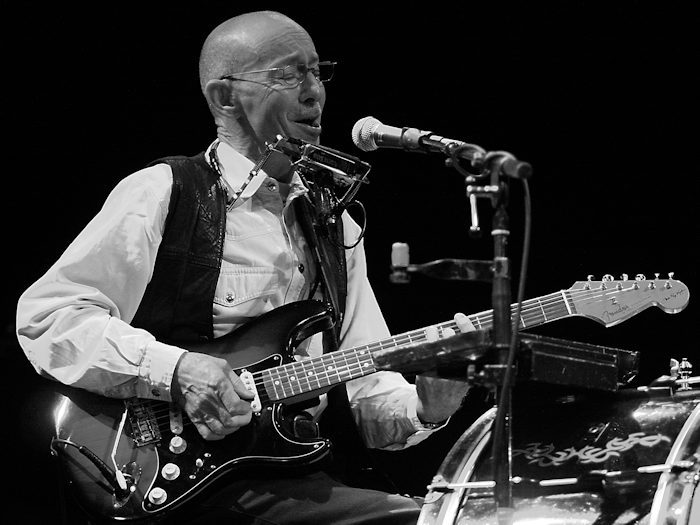
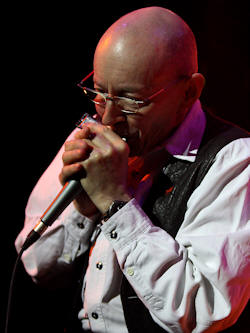 Alan:
What first attracted you to the blues?
Alan:
What first attracted you to the blues?